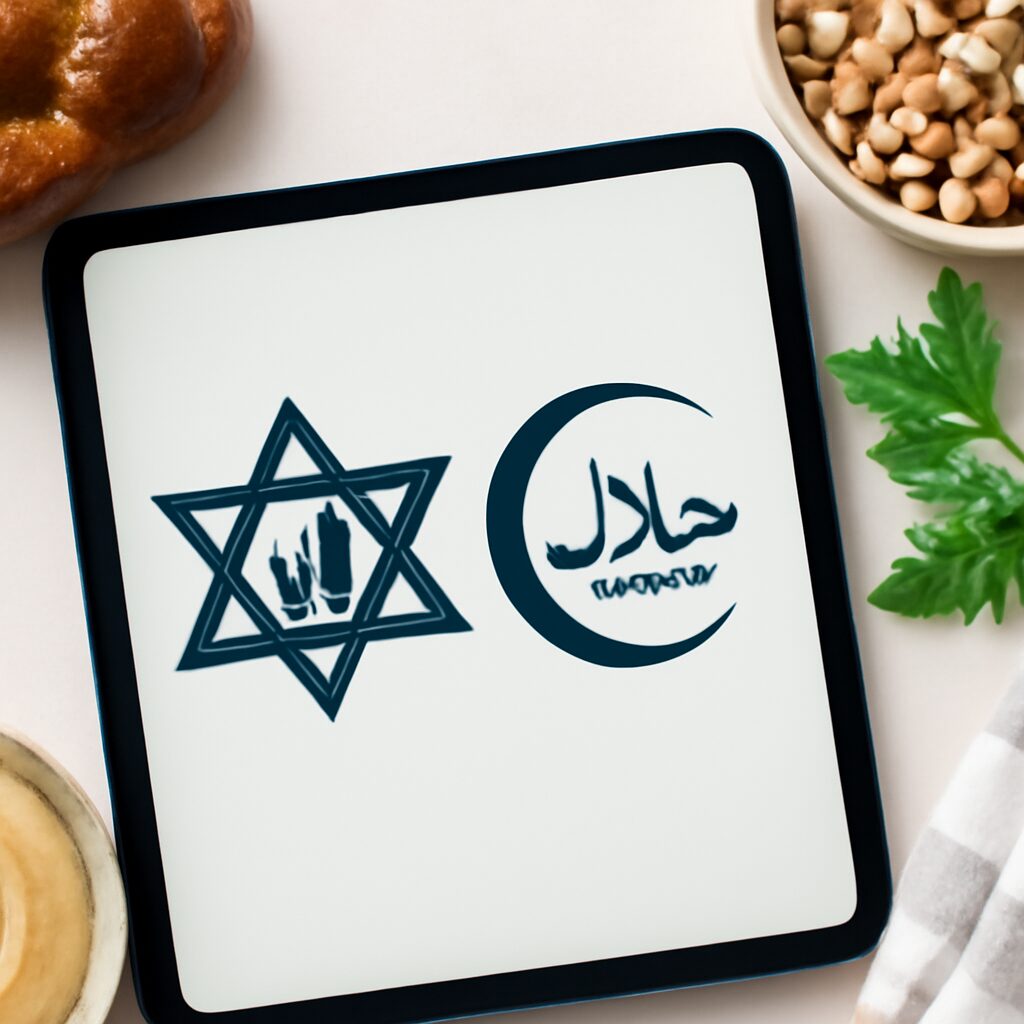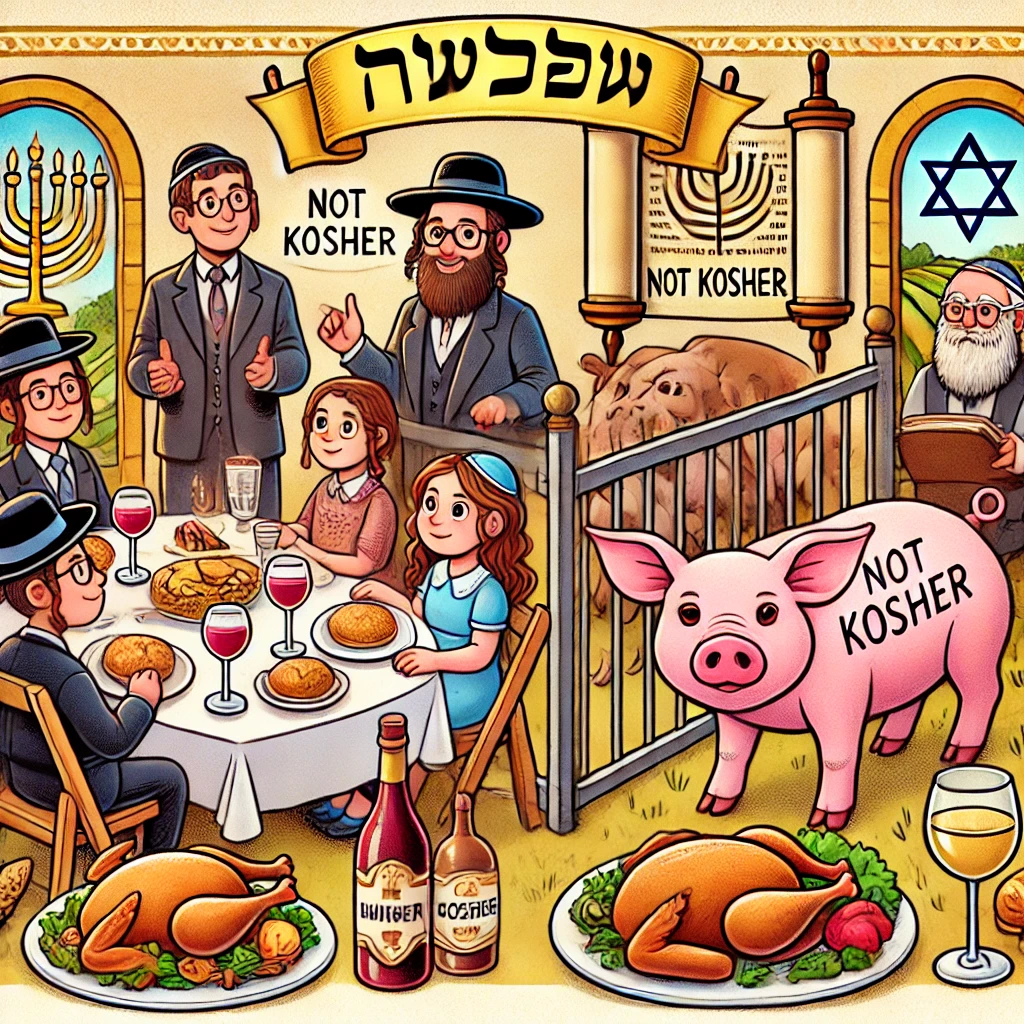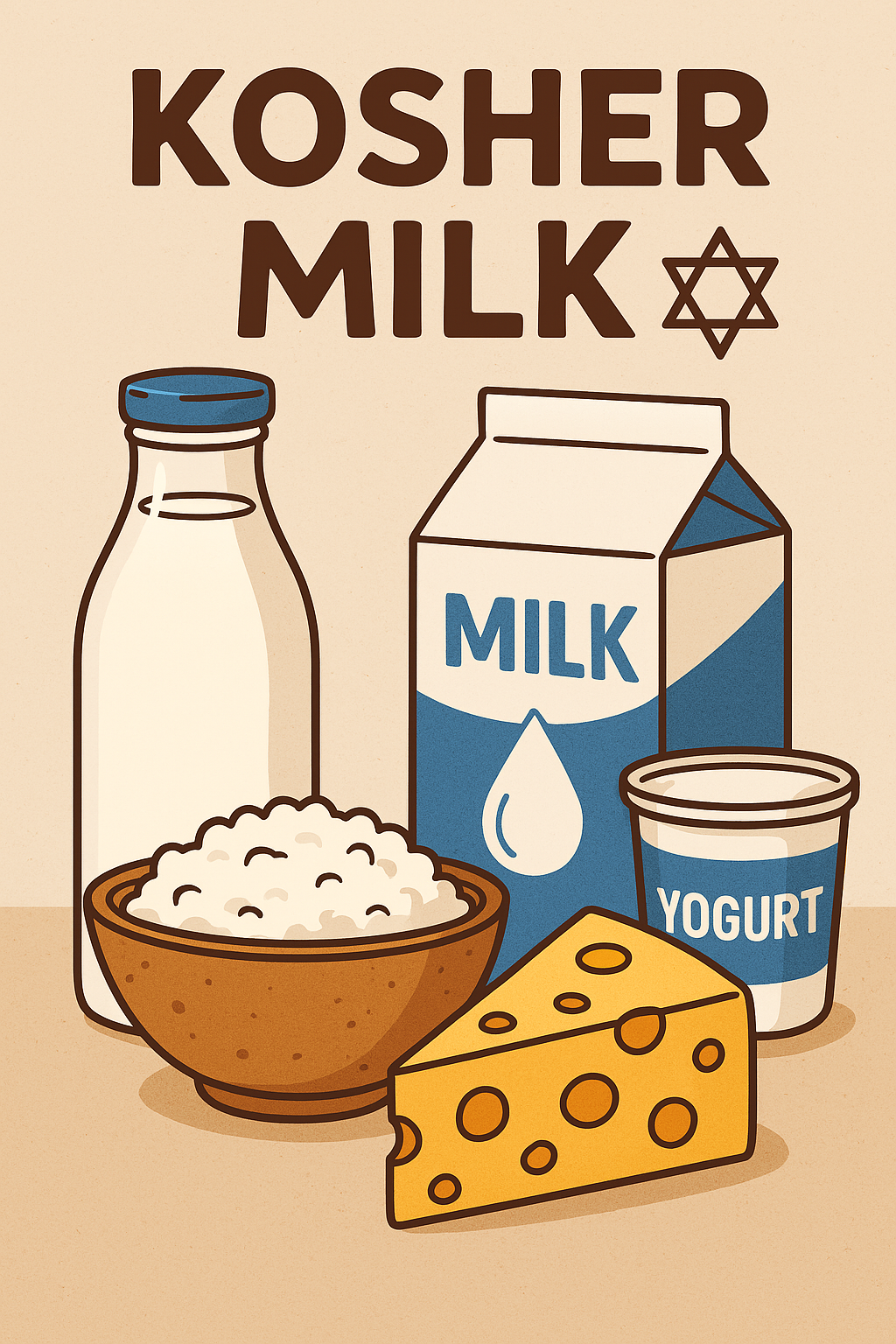
Kashrut and Halal are sets of dietary laws observed by Jewish and Muslim communities, respectively. Both systems outline what foods are permitted and how they should be prepared, though they differ in specific rules and religious foundations. Understanding these guidelines offers insight into the cultural and spiritual significance of food in both traditions.
Both Judaism and Islam have special rules about what people can eat, called dietary laws. Jews follow Kashrut (keeping food kosher), and Muslims follow the rules of Halal (permitted foods). These food rules come from each faith’s holy books and traditions, and they guide believers to honor God while eating.
Kashrut and Halal have many things in common. Both list which foods are allowed or forbidden, and they require kind treatment of animals during slaughter. However, there are also some differences, which we will see by comparing what is allowed, how food is prepared, and why these rules matter.

Allowed and Forbidden Foods
Basic Rules
Both kosher and halal diets list foods that are allowed and foods that are forbidden. For example, both Jewish and Muslim rules forbid eating pork (pig meat), so you will never see a religious Jew or Muslim eating bacon or ham. Both also forbid eating animals that were not slaughtered properly or that died on their own.
Meat and Land Animals
In Judaism, to be kosher, a land animal must have split hooves and chew its cud. That means animals like cows, sheep, and goats are kosher, but pigs are not (because pigs do not chew cud). Animals such as rabbits and camels are also not kosher because they don’t meet those requirements.
In Islam, the rule for meat is simpler: pork is completely forbidden, but other animals like camels and rabbits are allowed if they are slaughtered in the proper halal way. Both faiths also forbid eating predators or carnivorous animals, so nobody following these laws would eat a lion, dog, or eagle.
Seafood
Jewish dietary laws only allow seafood that has fins and scales. This means fish like salmon, tuna, and carp are kosher, but shellfish such as shrimp, crab, lobster, and clams are not kosher. In Islam, seafood is generally allowed, so a Muslim can eat shrimp, crab, and other shellfish that are forbidden in Kashrut.
Insects and Other Small Creatures
Both religions also avoid eating insects or bugs. Traditional Jewish law technically permitted certain locusts, but today almost no one eats insects in either community. Muslims likewise do not consider insects to be food in normal circumstances.
Ritual Slaughter Methods
Jewish Method (Shechita)
In Judaism, the process of slaughtering allowable animals is called shechita. A trained Jewish butcher (called a shochet) uses a very sharp knife to cut the animal’s throat in one quick stroke. This method is meant to be as swift and humane as possible to avoid causing pain. The shochet says a blessing to God before beginning the slaughter. After the cut, the blood is drained out, because eating blood is not allowed in Kashrut.
Islamic Method (Dhabihah)

Preparation and Cleanliness in the Kitchen
Kosher: Separating Meat and Dairy
Jewish law has strict rules about keeping meat and dairy products separate. In a kosher kitchen, people do not cook or eat meat and milk together (for example, a cheeseburger is not kosher). Families that keep kosher often have separate sets of dishes, utensils, and pots: one set for meat and another for dairy. They might also wait several hours after eating a meat dish before having any dairy. These practices come from a biblical commandment not to “boil a young goat in its mother’s milk,” which is understood to mean milk and meat should not be mixed.
Halal: Cleanliness and Purity
In Islam’s halal rules, there is no requirement to separate meat and dairy. A Muslim can enjoy a cheeseburger as long as the meat is halal. However, cleanliness is very important in halal cooking, so any utensil or surface that touched something haram (forbidden, like pork or alcohol) must be washed very well before using it for halal food. For example, if a pan was used to fry bacon, a Muslim will scrub it thoroughly before cooking anything else in it.
Both kosher and halal followers pay close attention to keeping the kitchen clean. Cross-contamination (tiny traces of forbidden food mixing into allowed food) is a big concern. Cooks are very careful to keep their tools and surfaces clean and separate to avoid any accidental mixing of forbidden ingredients.

Blessings and Saying Thanks Over Food
In Judaism, there are blessings (called brachot) for different foods and also a longer blessing after meals. For example, before eating bread, a Jewish person says a short blessing thanking God for “bringing forth bread from the earth.” Even a simple snack like an apple has a brief blessing to thank God for creating it. These prayers make people pause and remember that food is a gift from God.
For Muslims, it is common to say “Bismillah” (meaning “In the name of God”) before eating or drinking, and to say “Alhamdulillah” (meaning “Praise be to God”) after finishing a meal. These simple phrases remind them that eating is not just feeding the body but also an act of thanking the Creator. By saying Bismillah and Alhamdulillah, Muslims start and end their meal with mindfulness of God and gratitude.
The Role of Alcohol
Muslims do not consume alcohol at all, as it is considered haram (forbidden). This means not drinking beverages like beer or wine, and also avoiding foods that contain alcohol. For example, a Muslim would not use vanilla extract made with alcohol or eat a stew that was cooked with wine. Even a small amount of alcohol in food or medicine is not allowed in halal practice.
In Judaism, alcohol is generally allowed if it is kosher. Many Jewish celebrations and rituals include wine (for example, on the Sabbath or at Passover). To be considered kosher, wine and grape juice must be made under certain guidelines, but other drinks like beer or whiskey can be kosher as long as they have no non-kosher ingredients. Jews who strictly keep kosher will look for a kosher symbol on alcoholic beverages to be sure they meet the requirements.
Spiritual Meaning of the Food Laws
For Jewish people, keeping kosher is a way of obeying God’s commandments as written in the Torah. It is a daily practice that reminds them of their faith and identity. Every time a Jewish person chooses a kosher meal or refuses a non-kosher food, it is an act of devotion and discipline. Keeping kosher also connects them to the Jewish community, since Jews around the world follow similar rules.

For Muslims, eating only halal is equally important. The Quran (Islam’s holy book) gives instructions on what is lawful (halal) and unlawful (haram), so following these food rules is a form of obedience to Allah (God). By refusing foods that are not allowed, a Muslim practices self-control and stays mindful of their faith even in everyday activities like eating. It also creates a sense of unity, because Muslims worldwide follow the same basic halal guidelines.
In both religions, these food laws make the act of eating more than just physical — it becomes a way to serve God. Believers follow these rules mainly because they believe God has commanded them. By keeping kosher or halal, people practice obedience, self-control, and gratitude in their daily lives.
Modern Practices and Certifications
In today’s world, keeping kosher or halal is made easier by certification labels. Special organizations inspect foods and, if everything meets the religious rules, they allow the product to carry a kosher or halal symbol on its package. Shoppers can then simply look at the package to see if the item is okay for them to eat.
“Pareve” means the food has no meat or dairy ingredients, so it can be eaten with either meat or dairy meals under kosher rules. Kosher certification symbols like this are printed on many food packages to help Jewish consumers quickly identify products that meet their dietary laws.
This milk carton from Hong Kong has a green Halal logo with Arabic and Chinese text. The Arabic word in the circle means “halal,” telling Muslim buyers that this milk is permitted. Modern halal labels appear on products worldwide, and they show that the item has been checked and approved according to Islamic dietary laws.
Beyond grocery items, people can also find kosher or halal food in restaurants and butcher shops. In many cities, there are halal markets or kosher delis that display signs and certificates announcing their status. Some eateries even have an official document from a rabbi or an Islamic authority in the window. This gives customers confidence that the food meets the proper religious standards.
Challenges in Today’s Food Industry
Even with clear rules and labels, following a strict diet can be challenging in modern times. One big issue is cross-contamination in factories. In large food processing plants, the same equipment might be used for many different products. If a machine processes something with pork and then something that is supposed to be halal or kosher, tiny leftovers could mix in. To prevent this, companies have to clean the machines very thoroughly or use separate production lines. Kosher production may even have a supervisor (called a mashgiach) on-site to ensure everything stays kosher.
Another challenge is hidden ingredients. Some food ingredients are not obviously meat or alcohol but can come from forbidden sources. For example, gelatin (used in gummies and marshmallows) can be made from pig or from cow bones. If a candy label just says “gelatin,” a kosher or halal consumer might not know if it’s allowed. Similarly, a “natural flavor” in a snack could be made from something like beef stock or alcohol. This is why many religious consumers prefer products with clear kosher or halal certification, so they don’t have to guess about these ingredients.
There have also been cases of mislabeled products – foods that claim to be halal or kosher when they really are not. Sometimes this happens by mistake, and in rare cases it might even be done on purpose (to mislead people). For instance, a shop might sell meat advertised as halal, but it wasn’t actually slaughtered in the halal way. These problems make trust and reliable certification very important. People tend to buy brands or shop at places they know are careful about the rules.
Eating outside the home can also be tricky. In a regular restaurant, a dish might have hidden non-kosher or non-halal ingredients. For example, a vegetable soup might be made with chicken broth, or a “vegetarian” sauce might include wine. Because of this, Jews who keep kosher usually only eat at kosher-certified restaurants or homes. Muslims who strictly eat halal will often ask questions about ingredients and food preparation, or they choose restaurants that openly advertise as halal.
On the bright side, it is getting easier in many places to find kosher or halal options. Large supermarkets often have special sections for these products, and more companies are producing foods that meet the standards. There are also smartphone apps and websites that help people find halal or kosher dining choices or check if a product is acceptable. Even airlines offer special kosher or halal meals if you request them in advance. Still, someone following these laws must stay alert, because mistakes or mix-ups can happen.
Conclusion
Kashrut and Halal are two sets of religious food rules that show how closely food and faith can be connected. They influence not only what people eat, but also how people prepare food and remember to be grateful for it. The specific rules have differences (for example, rules about mixing dairy or about drinking alcohol), but both systems share similar core values. In both cases, following these laws is about obeying God, treating animals with respect, showing self-control, and being thankful — turning something as everyday as eating into a meaningful, spiritual act.
Frequently Asked Questions
What is the main difference between Kosher and Halal?
The main difference is that Kosher (Jewish dietary laws) prohibits the consumption of pork and shellfish, and requires meat and dairy to be kept separate, while Halal (Muslim dietary laws) prohibits pork and alcohol but allows meat and dairy to be mixed. Both require specific slaughter methods.
Can Muslims eat Kosher food?
Muslims can eat Kosher meat if Halal meat is not available, as the slaughter methods are similar. However, some Halal authorities may require additional verification, and alcohol-based ingredients in Kosher products may still be prohibited for Muslims.
Is Kosher food automatically Halal?
No, Kosher food is not automatically Halal. While there are overlaps (e.g., no pork), Kosher allows alcohol in food, and Halal requires a specific Islamic blessing during slaughter, which Kosher does not include.
Why do Jews separate meat and dairy in Kosher rules?
Jewish dietary laws (Kashrut) forbid mixing meat and dairy based on a biblical commandment (Exodus 23:19). Separate utensils, cookware, and waiting periods between meals are required to prevent any mixing.
Are gelatin and marshmallows Kosher or Halal?
Most gelatin and marshmallows are not Kosher or Halal if derived from pork. Kosher versions use fish or beef gelatin (from Kosher-slaughtered animals), while Halal versions use Halal-certified beef or plant-based alternatives.






